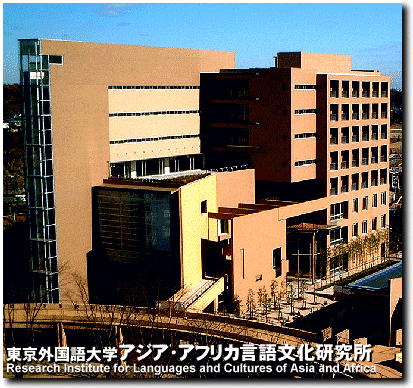 |
| History and Features A Guide to ILCAA: 1998 |
| The Research Institute for the Languages and Cultures of Asia and Africa (ILCAA) is the first institution to be designated as an Inter-University Institution in humanities and social sciences in Japan. The mission of Inter-University Institutions is to promote multi-disciplinary research by means of providing research materials and facilities for scholars who belong to various universities and institutions of the country. |
| Since the reconstruction of the nation after World War II, it was recognized that Japan should have strong relations with the nations in Asia and Africa. Based on this understanding, the Science Council of Japan issued a recommendation in 1961, to establish a national government research institution for the study of the languages and cultures of Asia and Africa. In April 1964, with the help of various people and organizations, our Institute was inaugurated as an affiliate of the Tokyo University of Foreign Studies. |
| The purpose of the Institute at the beginning included |
| (1) implementation and stimulation of research pertaining to the languages, linguistics, history, anthropology and ethnology of Asia and Africa through joint research projects and publications, | (2) compilation and publication of dictionaries and grammars of Asian and African languages | (3) sponsorship of intensive courses in Asian and African languages | |
| Since then, more than three decades have passed and the circumstances of our Institute have changed considerably. There is a strong demand for construction of new theories which are expected to overcome the limitations of the existing academic systems of linguistics, history and anthropology in Humanities and Social Sciences. It is related to the recognition that we need more global points of view which are free from conventional regional frames. We have been asked to deal with the recent phenomenon such as internationalization, fluidity of regional frames, aggravation of racial and religious antagonism, and rapid change of the world situations as seen in urbanization. On the other hand, thanks to the recent progress of data processing techniques, it has become possible to process not only literal information but also sound and image information. Moreover, attempts to integrate these individual information to an information network have been rapidly developing. |
| Taking into consideration these academic and social needs, the change of social situations in Asia and Africa, and the development of scientific techniques, our Institute underwent a reorganization in 1991, integrating sixteen small sections into four major sections and expanding the section for non-Japanese visiting faculty. The reorganized sections aim at construction of theories related to the integrated study of language and culture communication. Wide-ranging fieldwork, joint research projects, as well as efforts to construct theories and methods for integrated information processing are in progress. In addition, in order to support the doctoral course for area studies which was established in 1992 at Tokyo University of Foreign Studies, many academic members from our Institute have been participating in teaching graduate students. Furthermore, our Institute was designated as one of the Centers of Excellence (COE) by the Ministry of Education, Government of Japan and was included in the new 'Program for Supporting Core Research Institutes'. |
| Under the fluid world situation of post-cold war period and the rapid technical innovation in the development of information networks, it is our duty as well as our wish to keep up with these situations and to make active contributions not only towards the progress of the studies of languages and cultures of Asia and Africa in Japan, but also towards the academic exchanges between our country and the nations of Asia and Africa. |
 |